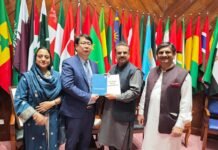Islamabad, 25 May 2023 (TDI): Huawei Middle East and Central Asia actively participated in a media roundtable held at the GSMA M360 EURASIA 2023 conference in the capital of Azerbaijan, focused on addressing the evolving landscape of telecom cybersecurity. The event facilitated an open dialogue among industry experts to explore innovative approaches and joint efforts in combating cybersecurity threats.
The panel discussion on May 17 aimed to align strategic priorities for the region while fostering stronger collaboration and collective action within the telecom industry. Under the theme “Build more secure and resilient telecom networks to efficiently support the future digital economy,” esteemed participants exchanged insights on various critical topics.
These included fostering partnerships among network operators, suppliers, and customers to fortify defenses against telecom cybersecurity threats, the role of regulatory bodies in promoting local cybersecurity development, and the significance of cybersecurity in protecting vital information infrastructure and the digital economy.
The distinguished panelists included Dr. Tural Mammadov, Director of the Azerbaijan Computer Emergency Response Center (CERT); Dr. Mohammad Khaled, Director, Business Development and Strategic Projects, e& enterprise; Dr. Haitham Hilal Al Hajri, Sr. Executive – Cyber Security Projects, Oman National CERT; Dr. Elvin Balajanov, Chairman of the Board, Azerbaijan Cybersecurity Organization Association; and Dr. Aloysius Cheang, Chief Security Officer, Huawei Middle East & Central Asia.
Recognizing the telecommunications industry as a critical infrastructure sector (CII) vital to connecting people, businesses, and governments globally, the discussion emphasized the increasing vulnerability of complex and interconnected telecom networks to cyber threats. Consequently, telecom cybersecurity emerged as a fundamental aspect of national security, necessitating the collaboration of telecom stakeholders to enhance cybersecurity measures.
This collaborative effort involves close cooperation among telecom service providers, equipment manufacturers, government agencies, and other relevant stakeholders to identify and mitigate cybersecurity risks, establish best practices, and raise awareness about the importance of cybersecurity in the telecom sector.
Also Read: Cyber Safety: How to Stay Protected in the Digital Age
Dr. Tural Mammadov expressed gratitude to the organizers, participants, and sponsors for arranging the event in Baku. He reiterated Azerbaijan’s commitment to upholding the highest cybersecurity standards, emphasizing the country’s alignment with the international community in addressing cybercrime risks and their determination to collaborate with global partners in defending telecom networks for leveraging digital economy opportunities.
Dr. Mohammad Khaled highlighted the crucial responsibility of telecom operators in securing their networks against cyber threats and ensuring a safe digital cyberspace, especially in the era of advancing connectivity and cognitive technologies. He emphasized that cyber threats transcend national boundaries and require global solutions, expressing pride in joining other partners and stakeholders in seeking collective solutions to this shared challenge.
Addressing the interconnected cyber world’s reality and the escalating threats from malicious actors, Dr. Haitham Hilal Al Hajri emphasized the shared responsibility of cybersecurity. He called for closer collaboration between national security agencies, telecom providers, and ICT industry players to fortify cybersecurity postures, enabling telecom providers to deliver cutting-edge digital services uninterrupted by cyber threats.
Dr. Elvin Balajanov underlined the significance of the event’s location in Azerbaijan and its focus on addressing cyber risks that pose potential harm to the nation’s networks and socioeconomic growth. Safeguarding critical information infrastructure emerged as a key priority for Azerbaijan, and Dr. Balajanov stressed the crucial role of telecommunications providers in implementing robust safeguards, protocols, and technologies to mitigate risks and protect the nation’s critical information infrastructure.
Dr. Aloysius Cheang emphasized the need to meet stringent compliance requirements while providing secure and trustworthy products and services that align with customer commitments. He advocated for a defense-in-depth approach to enhance security, ensure business continuity and efficiency, and improve customer experience, all while prioritizing user privacy.
Also Read: Australia-Korea Cyber & Critical Technology Policy Dialogue
Addressing the global nature of cyber threats, the discussion highlighted the importance of global standards, internationally agreed processes, and industry best practices to effectively combat these challenges. Huawei’s key strategy involves building and implementing a comprehensive global cybersecurity and privacy protection assurance system.
Complying with applicable laws, regulations, and international standards, Huawei has established an effective, sustainable, and reliable cybersecurity and privacy protection framework, guided by regulatory requirements, customer feedback, and industry best practices.
An exemplary initiative in this realm is NESAS/SCAS, a standardized cybersecurity assessment mechanism jointly defined by GSMA and 3GPP, leading standards-setting organizations in the telecom industry. Additionally, Huawei actively participates in telecom cybersecurity standardization activities led by GSMA, ITU-T, 3GPP, IETF, and collaborates with security organizations such as OIC-CERT and FIRST. Through these partnerships, Huawei ensures the cybersecurity of its customers and promotes healthy industry development.
Huawei firmly believes that cybersecurity and privacy are shared challenges that require collective efforts from governments, industry and standards organizations, enterprises, technology suppliers, and consumers. By collaborating with these stakeholders, Huawei aims to address cybersecurity and privacy challenges, foster innovation and transparency, and create an open and collaborative environment that reinforces the importance of cybersecurity in protecting digital assets.
Furthermore, Huawei’s commitment to offering secure and trustworthy products, solutions, and services aligns with its vision of a better life in the future digital world, where personal data is lawfully used and protected. Leveraging its extensive experience in advanced tech and industry 4.0 solutions, Huawei enables customers to secure their digital future while adhering to security-by-design and privacy-by-design principles.
Editor at TDI and GNP | mashraf12.ma@gmail.com








